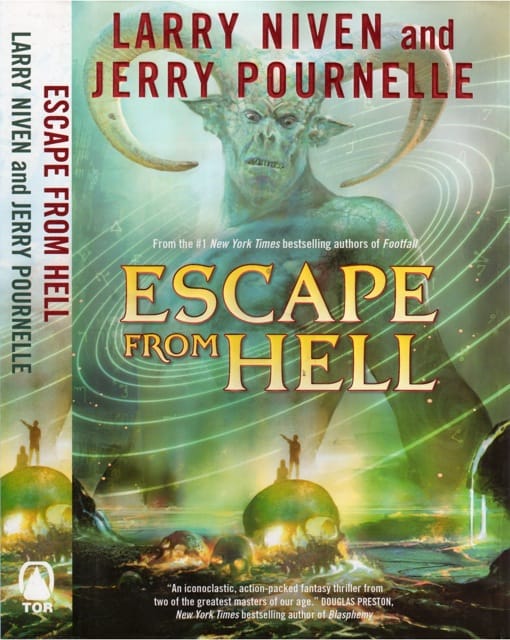The Long View 2007-01-02: Overdiagnosis; Literature Maps; Starship Jesus Conversion from Islam; Spengler's Deal; Shabby Hanging

I do agree with John here that our diagnostic tools often don’t improve health, and that the definitions of “disease” are often too broad, but I disagree about why healthcare doesn’t do much as you might think to improve our health. I definitely don’t blame administrative costs, although I wouldn’t be surprised if you could find something to cut there, it wouldn’t make healthcare in the US cost half as much. Universities are another matter.
Overdiagnosis; Literature Maps;
Starship Jesus Conversion from Islam; Spengler's Deal; Shabby Hanging
The smartest thing anyone has said in years about the US health-care system appears in an editorial in today's New York Times by members of the VA Outcomes Group of White River Junction, Vt.:
For most Americans, the biggest health threat is...our health-care system..more and more of us are being drawn into the system not because of an epidemic of disease, but because of an epidemic of diagnoses...First, advanced technology allows doctors to look really hard for things to be wrong. ...These technologies make it possible to give a diagnosis to just about everybody: arthritis in people without joint pain, stomach damage in people without heartburn and prostate cancer in over a million people who, but for testing, would have lived as long without being a cancer patient...Second, the rules are changing. Expert panels constantly expand what constitutes disease: thresholds for diagnosing diabetes, hypertension, osteoporosis and obesity have all fallen in the last few years. The criterion for normal cholesterol has dropped multiple times. With these changes, disease can now be diagnosed in more than half the population.
It's perfectly true: doctors will keep ordering tests no matter your physical condition until you tell them to stop. This practice is particularly pernicious in the case of the trusting and fragile elderly. That's half the explanation for the runaway insurance costs. The other half is bloated and duplicative (and triplicative) administration.
* * *
And if we must do tests, the best personality test I know of is to look at the books in the subject's home library. We soon learn that certain books belong in the same bookcase. Now comes Marek Gidney and his ingenious literature map, essentially a search engine where you input the name of an author and then see what other people who read that author are likely to read. (There are parallel engines for film and music). If this engine to be believed (and we should take it no more seriously than the "recommended books" feature at Amazon), communities of taste are not what we supposed. For instance, there is strangely little overlap between the readership of JRR Tolkien and that of CS Lewis. Tolkien fans favor high-concept science fiction; CS Lewis, to judge by this search engine, is read mostly as a devotional author. I also see that, if you read William Shakespeare, then quite likely you also read HP Lovecraft.
* * *
I don't believe it literally true that there are Millions of Muslims Converting to Christianity, but the reports to that effect multiply:
Around a million believed in Jesus over the past decade in Egypt. The Egyptian Bible Society used to sell about 3,000 copies of the JESUS film a year in the early 1990s. But last year they sold 600,000 copies, plus 750,000 copies of the Bible on tape (in Arabic) and about a half million copies of the Arabic New Testament. "Egyptians are increasingly hungry for God's Word," an Egyptian Christian leader told.
Does anyone have any hard information about this? And if so, why haven't you told me? What don't you want me to know?
* * *
Asia Times Spengler, seeking, no doubt, to annoy me in particular, suggests in his latest that President Bush's fortunes could be about to improve so dramatically that yet another Bush might successfully be elected to the White House in the near future:
[B]rother Jeb, about to step down as governor of the state of Florida, will be elected president of the United States in 2008, thanks in large measure to the rebound of the current president's standing.
For one thing, Spengler notes, the US position in the world is far better than the political class in advanced countries have reason to admit:
Asians cannot earn money to be saved without selling to the American consumer, and they cannot invest their savings except in United States. ...For all America's embarrassment in Iraq, none of its fundamental interests is impaired by Iraq's misery.
The real problem in that part of the world, as Spengler exhorts us every other Monday, is Iran:
There is no point negotiating with the present regime in Teheran...
This is because the current regime there knows its oil exporting period is nearly over, but has dealt with that fact by turning to apocalyptic fantasy. In contrast, we are told, China and Russia will pursue their real interests with sober good sense:
Securing Russian and Chinese cooperation with US strategic objectives, I believe, is a far simpler proposition than is portrayed in the myth of US imperial decline...
China must settle perhaps 15 million rural migrants in cities each year, while building infrastructure and employment in the interior and correcting urgent environmental problems. To do this, China requires stability and predictability in its foreign economic relations.
What does Russia want? Stability on its borders, often at the expense of the aspirations of peoples who have the misfortune to occupy the Russian near abroad, and a free hand in arranging the economic affairs of the Russian state.
According to Spengler, the US should and will drop its fancy notions about spreading democracy universally, but especially in the Russian Near Abroad. Similarly, the US should let it be known that it will stop pestering China about the yuan-dollar exchange rate. Then, Spengler assures us, the US would have all possible options for dealing with Iran, some of them much better than a speculative strike against Iran's nuclear facilities.
Henry Kissinger believed during the Vietnam War that the Soviet Union was offering to give the United States a free hand in Vietnam, even to invading and overthrowing the government in the North, if the US would acquiesce in a preemptive Soviet strike against China. Then Secretary of State Kissinger and President Nixon showed the proposal no favor.
In this they did wisely. Deals of this sort are like multilevel marketing schemes. They sound like good idea, but they aren't.
* * *
Speaking of impending atrocities, Anthony Sacramone at First Things has alerted an incredulous world to this project:
In this month’s Empire magazine Paul Verhoeven opened up about his upcoming project based, perhaps surprisingly, on the life of Jesus.
Verhoeven is a director with many films to his credit, but he holds a special place in the hearts of Heinlein fans for his 1997 adaptation of Starship Troopers. Anyone who is familiar with both the Heinlein story and the movie knows that we need not take Paul Verhoeven seriously about any book in the world.
* * *
Mark Steyn has some cutting things to say about the recent execution of Saddam Hussein, but not least about the official European reaction to it. We read:
According to a poll published in Le Monde, the majority of Spaniards, Germans, French and British were all in favor of executing Saddam. ...When Die Zeit and The Times and all the rest say that "Europe" condemns the death of Saddam, what they mean is that a narrow, remote, self-insulating politico-media elite condemns it....Whatever one's views on capital punishment, that's not what it's about. Hardcore dictatorships have to be not just politically but psychologically liberated. When one man is so murderously powerful, incarceration cannot suffice - because as long as he lives there will always be the possibility that he will return. ...
On the other hand, the hanging was not all we might have wished:
Unfortunately, when the US handed him over to the Iraqi authorities, the "authorities" did their best to look entirely unauthorized. Saddam was dispatched in some dingy low-ceilinged windowless room of one of his old secret-police torture joints by a handful of goons in ski masks and black leather jackets.
Steyn suggests that someone from the US embassy, or at least the military, should have been on hand to advise on the proper protocol. To that suggestion, I reply that the execution really was not supposed to be public. American executions these days are normally short on pomp and circumstance, too.
On the other hand, the addition of the ceremonial of public executions to the education of the diplomatic corps would add a whole new dimension to Foreign Service School.
Thank you
for visiting
this site!
---John J. Reilly
Copyright © 2007 by John J. Reilly
Support the Long View re-posting project by downloading Brave browser. With Both Hands is a verified Brave publisher, you can leave me a tip too!



Comments ()